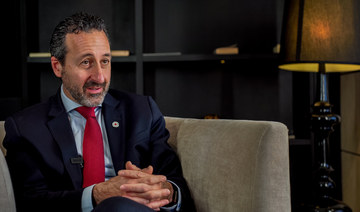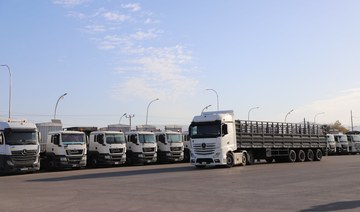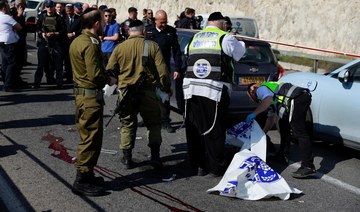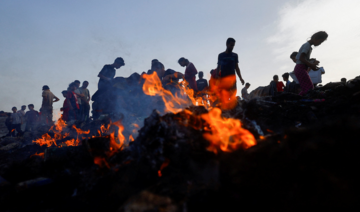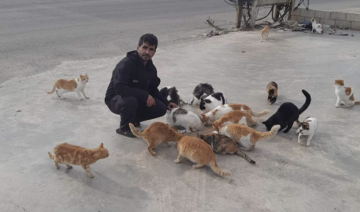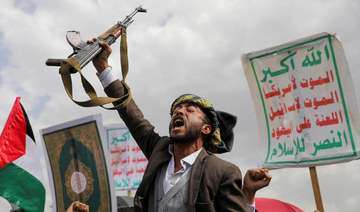GENEVA: Israel’s looming military push into the southern Gaza city of Rafah could have a dire impact, the Red Cross warned on Wednesday, demanding that “the fundamental principle of humanity” be upheld.
The International Committee of the Red Cross (ICRC) cautioned that increased and sustained hostilities in Rafah, where over 1.4 million Palestinians are trapped, posed a “disastrous risk to civilian lives and infrastructure.”
Israel and Gaza’s Hamas rulers have been at war for four months and the threat of a Rafah ground operation has triggered global alarm over the potential for mass civilian casualties.
“We renew our call on the parties to the conflict, and all who have influence on them, to spare and protect civilian lives and infrastructure,” Fabrizio Carboni, the ICRC’s Middle East director, said in a statement.
“Under international humanitarian law, parties to the conflict must ensure the basic necessities of life are provided and the necessary safeguards to preserve life are undertaken for the civilian population,” he said.
The Hamas attack that triggered the war resulted in the deaths of about 1,160 people in Israel, mostly civilians, according to an AFP tally based on Israeli official figures.
At least 28,500 people, mostly women and children, have been killed in Israel’s response, according to the latest Gaza health ministry figures.
Pointing to indications that “a new phase of the conflict is unfolding,” the ICRC insisted that “even amidst the carnage and extreme polarization, the fundamental principle of humanity must be upheld.”
Israel, as the occupying power, bore responsibility under international law for ensuring that the basic needs of the civilian population are met, it said.
ICRC stressed that “forced displacement” was explicitly banned under international humanitarian law, as was the use of human shields and indiscriminate attacks that cause disproportionate civilian death, injury and destruction.
Any planned evacuations ahead of an incursion, meanwhile, entailed a long list of responsibilities.
“Evacuations have to ensure that civilians arrive safely, and have satisfactory conditions of hygiene, health, safety and nutrition, and that members of the same family are not separated,” the ICRC said, adding that they also “must be able to return to their homes as soon as hostilities have stopped.”
Those responsible for the evacuations also needed to “account for the reality of massive numbers of people moving across bomb-damaged roads, past the rubble of destroyed buildings and through areas contaminated by unexploded weapons,” it added.
Israel military push in Rafah poses ‘disastrous risk’: Red Cross
https://arab.news/bugj4
Israel military push in Rafah poses ‘disastrous risk’: Red Cross
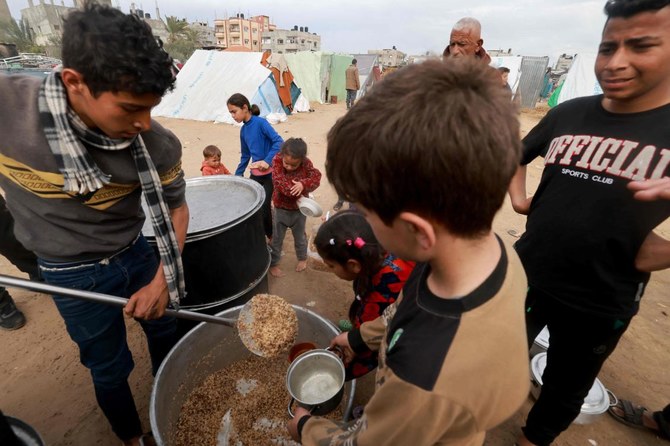
- ICRC cautioned that increased and sustained hostilities in Rafah posed a “disastrous risk to civilian lives and infrastructure”
- “We renew our call on the parties to the conflict, and all who have influence on them, to spare and protect civilian lives and infrastructure,” the ICRC’s Middle East director said
New settler units on Palestinian land hand Israel a powerful demographic weapon

- Israeli authorities accused of exploiting Gaza war to create “more facts on the ground” in occupied West Bank
- Uptick noticed in approvals for illegal settlements in East Jerusalem within or alongside Palestinian neighborhoods
LONDON: On July 11 last year, 68-year-old Nora Ghaith and her husband Mustafa Sub Laban lost their battle to hold on to their home in Jerusalem’s Old City — in which Ghaith was born — when Israeli police broke down their door and forcibly evicted the elderly couple.
The eviction of the last remaining Palestinians in an apartment building now filled with settlers was carried out under a controversial law. This legislation enables Jews to claim properties that supposedly belonged to their families before they were evicted in 1948, and were subsequently occupied by Palestinian refugees.
The Legal and Administrative Matters Law was passed in 1970 after Israel annexed East Jerusalem. The same law does not, however, permit the far larger number of Palestinians whose families were evicted from West Jerusalem in 1948 to reclaim the properties they lost.
In fact, the Absentee Property Law, passed in 1950 and amended in 1973, prevents Palestinians from reclaiming lost properties.
Both laws are doubly unjust, critics say, because Jews who left East Jerusalem in 1948 were later given Palestinian properties in West Jerusalem as compensation, and in being allowed to “reclaim” properties in East Jerusalem are being doubly compensated.
Last year, the “deeply shocking and heart-breaking” eviction of the Ghaith-Sub Laban family and many other Palestinian families in East Jerusalem was condemned by UN experts as “part of Israel’s apartheid machinery at work, designed to consolidate Jewish ownership of Jerusalem and racially dominate the city’s population.”
The human rights special rapporteurs said such evictions were “a gross violation of international humanitarian law and a war crime,” and evidence of “intention to annex and colonize the occupied territory in violation of international law.”
Less than a year on, however, two Israeli human rights nongovernmental organizations said that while the global community’s attention has been focused on the death and destruction unfolding in Gaza, there has been “a major acceleration in the promotion and fast-tracking of new settlement plans in East Jerusalem and a dramatic spike in the rate of demolitions of Palestinian homes.”
The Israeli government “is clearly exploiting the war to create more facts on the ground to predetermine the final status of Jerusalem and thwart all prospects for a negotiated political agreement, while forcibly displacing Palestinians from their homes and the city,” Amy Cohen, director of international relations at Ir Amim, told Arab News.
Ir Amim, or City of Nations, is an Israeli NGO working “to render Jerusalem a more equitable and sustainable city for the Israelis and Palestinians who share it and to help secure a negotiated resolution on the city.”
Research, carried out jointly with Bimkom-Planners for Planning Rights, reveals that between Oct. 7 last year and March 10, some 98 Palestinian homes were demolished — an almost two-fold monthly increase compared with the period preceding the war.
At the same time, there has been “a major uptick” in efforts to create illegal settlements in East Jerusalem either within or alongside Palestinian neighborhoods.
These plans provide for more than 12,000 housing units. With an average 6.5 births per woman among ultra-Orthodox Jewish families recorded in the period 2019 to 2021, this means tens of thousands of additional settlers will be moving into East Jerusalem.
According to the most recent census, approximately 361,700 (61 percent) of East Jerusalem’s population are Palestinian Arabs. The remaining 234,000 (40 percent) are Jewish — all of whom are regarded by the international community as illegal settlers in the territory, which has been occupied by Israel since the Six Day War in 1967.
The growing number of illegal settlements is especially concerning in light of the statistics for violent assaults in the West Bank. According to the UN Office for the Coordination of Humanitarian Affairs, from 2008 to May 12 this year, 1,498 Palestinians were killed in the West Bank and East Jerusalem — 10 times as many as the 149 Israeli deaths reported.
There is an even greater disparity in the number of injuries on both sides — 95,383 Palestinians and 2,373 Israelis.
The Israeli authorities “are certainly exploiting the circumstances right now, taking advantage of the fact that the international community is obviously overwhelmed with the horrific, catastrophic conditions in Gaza and all of its implications,” said Cohen.
“So, while the attention is diverted there — and the Israeli government is complicit in this — the activists in the settler movement are really taking advantage of the circumstances to create more ‘facts on the ground.’”
These “facts” are motivated by the Israeli government’s policy “to ensure that Jerusalem remains what they often call the ‘united, eternal capital of Jerusalem,’ and to preserve the essence of the city being a Jewish capital.
“That means not only do they have to secure control over as much space as possible, but also over the demographic balance of the population — the demographic majority must be in favor of Jewish Israelis, which is being achieved by targeting the Palestinian population.”
She added: “These policies and these measures essentially put a cap on the Palestinian demographic, which serves as a form of — and it’s horrific to even say this — but a form of displacement and population control, to ensure that there will be a Jewish demographic majority in the city.
“And this has been playing out in the form of demolitions.”
Since Oct. 7, plans for no fewer than eight new settlements in East Jerusalem have been fast-tracked.
The fear, said Cohen, was that the situation was approaching a tipping point beyond which the implementation of a two-state solution would become impossible.
“If the international community were to come together today with representatives of Israel and the Palestinian Authority and begin to sit down and draw some sort of road map, it would look very, very different than it did 20 years ago, during Camp David or even before that during the Oslo Accords,” she said.
“Obviously, any road map would have to be adapted to the reality of today. You cannot reverse most of what has happened up until now in Jerusalem. But you can certainly prevent what Israel is trying to do right now.
“And so first and foremost is the need to really address the here and now, to halt the major developments on the ground for settlements and to halt the mechanisms of displacement, such as demolitions and evictions.”
She added: “If the international community is really serious about a two-state solution, it needs to act now to hold Israel accountable to international law and the parameters of a two-state solution, and so far we haven’t seen that.”
Since the outbreak of the war there has been renewed discussion about the need to jump-start a new peace process, to renew dialogue toward an agreed-upon negotiated resolution.
“But with that, we have to bring back the centrality of Jerusalem in the debate, because without Jerusalem there is really no two-state solution.
“And as we all know, without a two-state solution, we will not be able to achieve peace and security for all of us, Israelis and Palestinians, living between the river and the sea.”
Aid trucks arrive in Gaza, but no deliveries yet

CAIRO: More than 100 aid trucks managed to reach the Gaza Strip by Monday morning after an agreement to reroute aid through the Kerem Shalom border crossing, but supplies have not been distributed amid an ongoing Israeli assault, sources said.
Deliveries are badly needed as little aid has reached southern Gaza since May 6, when Israel took control of the Palestinian side of the Rafah border crossing, about 3.5 km from Kerem Shalom and the main entry point into Gaza for humanitarian and commercial supplies.
The latest arrivals would be the biggest aid delivery into southern Gaza by far since the launch of Israel’s attacks in Rafah, with most days seeing no trucks crossing the border.
Israeli forces began a ground offensive in the east of Rafah over three weeks ago. An Israeli airstrike on Sunday triggered a fire that killed 45 people
Officials said in a tent camp in Rafah on Monday, prompting an outcry from global leaders. Egyptian security sources said 123 aid trucks had crossed the border and delivered goods to the UN.
An Israeli source confirmed that aid had been brought into Gaza and delivered to partners.
An Egyptian aid source said four fuel trucks had also crossed the border.
However, UN and Palestinian officials said Palestinian trucks that went to pick up the aid at the crossing returned empty.
“Trucks moved through, but it was not possible to collect them due to the rocket attacks and the IAF (air force) strikes,” said a UN official in Gaza, adding that the supplies belonged to the UN’s Palestinian aid agency UNRWA and the World Food Programme.
On Friday, Egypt and the United States agreed to utilize Kerem Shalom until arrangements were made to re-open Rafah from the Palestinian side, the Egyptian presidency said. Egypt has refused to coordinate with Israel on the crossing.
With few signs of Syria solution, EU pledges more support to refugees

- Jordan’s foreign minister said the international community was abandoning Syrian refugees as funding to support them in host countries dwindles
BRUSSELS: The European Union pledged more than 2 billion euros ($2.2 billion) on Monday to support displaced Syrians, but it dismissed any notion of them being able to return home because of instability under Syrian President Bashar Assad.
Before an EU-led donor conference on the 13-year-old war, Jordan’s foreign minister said that the international community was abandoning Syrian refugees as funding to support them in host countries dwindles, suggesting that ways had to be found to ease voluntary returns to Syria.
The EU conference aims to keep the war on the agenda, as well as support for the millions of refugees it has created. But as the economic and social burden on neighboring countries mounts the bloc is divided and unable to find solutions, diplomats say.
Refugees returning home is not yet one of them however, the bloc’s foreign policy chief Josep Borrell made clear at the start of the conference.
“While the European Union would wish that returning home could be a realistic option for all refugees, everywhere and always, we concur with the United Nations system that currently the conditions for safe, voluntary and dignified returns to Syria are not in place,” Borrell said.
“We insist that it is the Assad regime that bears the primary responsibility for putting in place these conditions.”
Borrell said the bloc was pledging 560 million euros in 2024 and 2025 to support refugees in Syria, Lebanon, Iraq and Jordan and a further 1 billion euros for Turkiye.
Syria has become a forgotten crisis that nobody wants to stir, amid the Israeli war in Gaza and tensions growing between Iran and Western powers over its regional activities.
Although Assad has long since reasserted control over most of Syria in a war that began with a 2011 uprising against him, more than 5 million refugees mostly in Lebanon, Turkiye and Jordan and millions more displaced internally still have little prospect of returning home.
“We’re going to be sending a very clear message from Jordan as a host country that we feel that refugees are being abandoned,” Ayman Safadi told reporters on arrival in Brussels. “Host countries are being abandoned.”
Jordan is hosting around 1.3 million Syrians. Safadi said the issue “can only be solved by them going back to their country. So we need to focus more on creating conditions conducive for them to return voluntarily.”
Funding to support refugees is dropping with the likes of the World Food Programme reducing its aid. Countries say hosting refugees is an increasing burden, notably in economic crisis-hit Lebanon, where the discontent has seen forced deportations.
“We expect our partners to uphold international law, including the principle of non-refoulement, and reject and condemn any forced deportations,” Borrell said.
The 8th Syria conference brings together European and Arab ministers along with key international organizations, but beyond vague promises and financial pledges there are few signs that Europe can take the lead, diplomats said.
The bloc has no ties with the Assad government and Monday’s talks come just ahead of the European elections on June 6-9 in which migration is a divisive issue among the EU’s 27 member states. With far-right and populist parties already expected to do well, there is little appetite to step up refugee support.
An upswing in migrant boat arrivals from Lebanon to Europe, with Cyprus and Italy major destinations, has prompted some EU countries to warn of a big new influx into the bloc.
“We’ll continue to do everything we can. But unless we’re helped, unless the international community shoulders its responsibility, there will be a decrease in services and there will be more suffering for refugees,” Safadi said.
Motorcyclist killed in Israeli strike near hospital in southern Lebanon

- Health Ministry denounces ‘full-fledged crime’ as health care workers, patients injured in drone attack
BEIRUT: An Israeli strike on Monday outside a hospital in south Lebanon killed one person, the latest deadly raid in the country’s south.
Victim, Ali Wizani, on a motorcycle at the hospital entrance, was heading for medical tests.
Fifteen other people sustained varying injuries, including seven civilians and eight health care workers at Salah Ghandour Hospital in the city of Bint Jbeil.
The hospital security guard, Hassan Jouni, underwent surgery due to severe injuries.
An Israeli combat drone carried out Monday’s attack during a peak time when patients were arriving at the hospital at the start of the week.
For the first time since the hostilities began in the southern Lebanon border area, the Israeli army targeted the vicinity of a hospital on Monday morning.
The Israeli military has increased its efforts in recent days to apprehend individuals using cars or motorcycles on the roads, resulting in the fatalities of Hezbollah members and civilians.
The Lebanese Ministry of Health condemned the brutal Israeli shelling that targeted the hospital.
The hospital “is the only one still operating in this area from which residents have been displaced due to Israeli attacks,“ its director, Dr. Mohammed Sleiman, told Arab News.
“When the drone carried out its attack on the hospital entrance, there were people gathered to enter, which caused injuries.”
He said: “The hospital staff quickly evacuated the patients from the damaged front floors.
“We found that the shells used contained nails or iron fragments that left traces in the hospital building.
“The hospital’s role is humanitarian. The Israelis know the hospital very well, and we follow all required instructions during wars.”
Dr. Sleiman added: “In the July 2006 war, the hospital was subjected to direct shelling, and after today’s attack, we resumed work normally.
“We receive all patients in addition to the wounded from Israeli attacks. We currently have 17 patients besides the war-wounded.
“We receive non-urgent surgeries, and we have a medical team residing in the hospital since the attacks began.
Ambulances operate normally, and the medical staff comes to the hospital as usual. After the attack, doctors and nursing staff who were off-duty came to the hospital to help.
“We do not suffer from any shortages of medicines and equipment, as the Ministry of Health supplies us with what we need.”
The Health Ministry described the hospital attack as a “full-fledged war crime and a new episode in the series of repeated and flagrant violations committed by Israel against health care facilities and health care workers in Lebanon, violating all human rights laws, the Geneva conventions, and all international laws and norms that stipulate the protection and respect of health care workers and the provision of safety for them during armed conflicts.”
Hezbollah retaliated against the Israeli assault on the hospital by “targeting and destroying the newly installed spy equipment at the Miskaf Am site.”
Media outlets in Israel reported that “firefighting crews are working to extinguish a massive fire that broke out in the settlement of Kiryat Shmona after rockets were launched from Lebanon.”
Hezbollah targeted “a building used by enemy soldiers in the Margaliot settlement with appropriate weapons and achieved confirmed casualties.”
The group also “launched an intense fire attack on the Al-Malikiyah position with guided missiles and artillery shells, targeting its garrison, its equipment, and the positions of its soldiers.”
Hezbollah used “attack drones on targets inside the site and hit them accurately” in its retaliation.
The Israeli army said that “a Sky Rider drone fell inside Lebanese territory, and the incident is being investigated.”
The Israeli military said that it bombed a building where Hezbollah members were located in the Yaron border area on Sunday.
Additionally, the air force targeted Hezbollah members in Hula, hitting a weapons storage facility in Mays Al-Jabal and military infrastructure in Khiam.
The Israeli raid on the town of Yaron led to casualties.
The border villages have not been spared from continuous Israeli bombardment, which it is said, aims to destroy homes and properties and burn crops with internationally prohibited phosphorus bombs.
An Israeli army spokesman said, “The Israeli forces have increased their readiness for the war on Lebanon. Over the past weeks, the 146th Division and the 205th Reserve Armored Brigade conducted an exercise at the division and brigade level simulating ground maneuvers in Lebanon.”
The spokesperson said “the exercise simulated combat scenarios on the northern front, the rapid deployment of forces in the field, the role of division and brigade command centers, and the readiness of forces for attack.”
Also on Monday, caretaker Prime Minister Najib Mikati discussed the security situation in the south with Gen. Aroldo Lazaro, the commander of UNIFIL Forces.
The talks included preparations to submit the periodic report to the UN Security Council about the implementation of Resolution 1701 and the coordination between UNIFIL and the Lebanese Army.
Outcry as Houthis put prominent judge on trial over ‘fake news’

- Militia actions that ignore people’s basic rights draw widespread condemnation
AL-MUKALLA: Yemen’s Houthi militia are preparing to prosecute Abdul Wahab Qatran, a prominent and outspoken judge, on charges of denigrating their leader and publishing false news, a Sanaa-based lawyer told Arab News on Monday.
Abdul Majeed Sabra, a Yemeni lawyer, said that the Houthi-run Specialized Criminal Prosecution in Sanaa will begin questioning Qatran on Tuesday after the Houthi security and intelligence service referred him to the court, accusing him of disseminating rumors, fake news, and inflammatory information about the militia’s leaders.
“The case has been sent to the prosecution for further investigation tomorrow. If he is brought in, the prosecution will investigate and either submit him to trial by indictment or rule that there is no grounds for initiating a case, which means he will be released,” Sabra said.
Armed Houthis surrounded and broke into Qatran’s home in Sanaa in January, destroying personal documents and furnishings.
The judge was abducted and taken to a security and intelligence agency detention center, where he was held in solitary confinement without access to medical care, a lawyer, or contact with his family.
Qatran was eventually allowed to call his family, who reported that he had been secluded and was “dying” as a result of isolation.
The judge was seized after criticizing the Houthis for human rights violations and failing to pay public workers. Shortly before his abduction he voiced sympathy for a journalist who was attacked and beaten by the militia in Sanaa.
In February, the Houthis’ Supreme Judicial Council stripped Qatran of immunity and ordered that he be punished for breaking the law.
His captors refused repeated requests from his family to visit him and provide him with his medications.
News that the Houthis were planning to try Qatran provoked an outcry from Yemeni activists and international rights groups, which demanded that the militia halt the prosecution and release him.
The Geneva-based SAM Organization for Rights and Liberties on Monday called the trial a “dangerous development,” and accused the Houthis of attempting to suppress the last outspoken citizens who live in regions under their control.
SAM said it “considers the Houthi group solely accountable for Judge Qatran’s safety and urges them to free him immediately.”
In a statement, it also called on the militia to “stop its actions that infringe people’s fundamental rights, particularly freedom of thought and speech.”
Meanwhile, the US Central Command said that its forces destroyed a drone launched by the Houthis over the Red Sea early on Sunday, the latest in a series of clashes between the Houthis and the US-led marine coalition.
The militia have not claimed to have struck any ships in international waters off Yemen or in the Indian Ocean in the last 48 hours.
Since November, the Houthis have seized a commercial ship in the Red Sea, sunk another in the same shipping lane, and fired hundreds of drones and ballistic missiles at international commercial and naval ships.
The militia claims its actions are in support of Palestinians under attack by Israel in Gaza.
At the same time, the UN Mission to Support the Hodeidah Agreement said on Sunday that four land mine explosions killed two civilians and injured four in April in three districts of the Red Sea province of Hodeidah.
This takes the total number of civilian casualties from land mines to 34, with 13 killed since the beginning of the year.
Human Rights Watch said last week that thousands of land mines laid by the Houthis continue to kill and maim people throughout Yemen.
Explosive devices also “poison fields,” leaving farmland unusable, it said.



